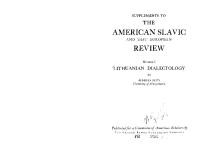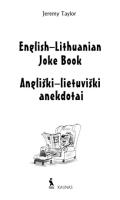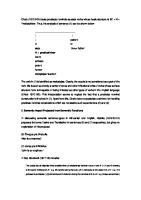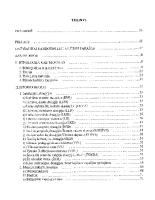Lithuanian self-instruction [PDF]
Chicago: Lietuva, 1908. — 74 pp. With the assistance of rev. C.E. Edwards, MA. For practical use by travelers, tourists
139 77 4MB
Lithuanian-English Pages [80]
Papiere empfehlen
Datei wird geladen, bitte warten...
Zitiervorschau
nstruction BY
the Assistance oi
E EDWARDS, Practical
Use by
EflJRfiBwRiKBwfvRa
Tourists and those :arn
M, A.
who wish
Othuaniafu
Published by
3232 South Haisted Chicago, Dlittois ^C 1908 A",
Street
Lithuanian
Self -Instruction .
J.
BY
LAUKIS
With the Assistance
REV.
C,
of
E EDWARDS,
M, A.
For Practical Use by
Travelers, Tourists and those to learn Lithuanian,
who wish
Published by
'LIETUVA", 3252 South Halsted Chicago, Illinois
X 1908
Street
The Lithuanian Alphabet. A, A, B, C, C, D, E, E, G, I, J, Y, J, K, S, T, U, y, V, Z, Z. The Li thuanian alphabet consists of 29 characters, ,
L,
M, N, O, P, R,
,
each one representing one invariable sound. The elementary sounds of the Lithuanian language are divided into Vocals, Semivocals and Consonants.
The
Vocal sounds are subdivided
Plain
and
(which
may
into
Nasal sounds.
The
Plain Vocal
be long and short);
i,
sounds are these: u, (which
a, e
are always short sounds)
;
(which are always long sounds). The Nasal Vocal sounds are these a, $ \, y. They are always long sounds, formed from a combination of a, e, i, u, and sound n, as in bank. The literary language 0, e, u,
:
,
of to-day thus expresses these nasal sounds, although still prefer to write them thus: an, en,
some authors
resembling the French usage. Lithuanian orthography is phonetic, each character having one invariable sound. When once this is acquired, the pronunciation is easy. In order to give an idea to the English student of the Lithuanian language, of its elementary sounds, we deem it well to give an explanation below of every sound separately. The a sound is the same as the English a in the word/a?', viz.: Tas, th&t;kas, who. The e sound answers to the English a in the word pass, viz.: Per, through; ten, there. A and e sounds can be long and short. in,
un
2047153
4 i
answers to the English sound and;
viz.: Ir,
i
in the
word
it,
always. u answers to the English short oo sound in the vis,
word book, viz.: Kur, where; tur, it has. The sounds and u are always short sounds, as here given. is the same as the English o in the word no^ i
viz.: Po, after; pro, by, past;
e is the
same
through.
as English a in the
word fare,
viz.:
Nera' there is not; e'da, it eats. y is the same as English ea in the word pease, viz. Yra', there is; y'la, awl. u is the same as English oo in the word coo?, viz.: Kn'nas, body;su'm, cheese. These four sounds are ',
:
always long. is the same sound as English j
y in
the word
yes,
The
peculiarity of the j sound is that it is always used before vowels in order to soften them, viz.: ja, je, ji, jo, ju. After the vowel or in the middle of a syllable i is used, viz.: ai, ei, oi, ui:
viz.: Jis, he;ji,
da-riau'
,
I
she.
have been doing.
has two sounds: soft and hard. The soft sound of can be likened to the English in the word less; and its hard sound can be learned from a native teacher. In its utterance, the lips are set as for sound of o, the tip of the tongue remains behind the teeth, while the tongue itself is pressed partly between the teeth. The sound is soft when it stands before e, stands before a, i, ], y, and it is a hard sound when it 0, u, i|, u, or when it concludes a word. m and n have the same pronunciation as in En1
I
I
I
glish, viz.:
Man,
,
for
me; namo', homeward.
always has greater stress than in English and has the same sound, as in many continental languages, viz.: Ba'tas, wheel; ra'stas, writing. r
answers to the English
v va'ltis,
v,
viz.:
copper;
Va'ris,
boat.
b is the
same
as in English in the
bee; bus, it will be. c consists of two sounds:
word
viz.:
be,
Bi'te,
somewhat
like ts in hats, viz.
t :
+ s and
is
pronounced
c/ar; cu'krus,
Ca'ras,
sugar. d is the same as the English d, work; du'rys, door. g answers to the English sound
viz.
Da'rbas,
:
word
in the
g
game, viz.: Oa'las, end;gilu's, deep. k is the English k in the word keg, viz.:
Kate
1 ,
cat; ka'le, bitch. p is the nas, food.
English
p, viz.
:
Pati', wife; herself;
the English S in the word
S is
viz.:
see,
pe'-
Sala',
island; se'nas, old. t
is
father; z is
the English tin the word tas,
viz.:
tea,
Te'vas,
that.
the English z in the word
cossak; zui'kis, hare. It
is
zeal, viz.
:
Kazo'kas,
but seldom used in the Li-
thuanian language. z
word
corresponds to the English s(zh) sound in the pleasure, viz.
:
Zo'dis,
word; zun's,
fish,
a softened t sound and answers to the English ch in the word church, viz.: Ra'tius, wheelwright; fi
is
gi'ncas, dispute.
answers to the English Sa'rmas, potash. The dz sound
is
the
same
sh, vjz.
:
Si'las,
as English
j
heath:
sound
the word judge, viz.: Dziu'ti, to dry; pradzia',
in
begin-
ning.
Besides those mentioned above there are three
more sounds from other alphabets
to 'express
their
6
corresponding sounds which are lacking in the Lithuanian language. These three are: f, h, and ch. The first two of the three have the same sound as in English, the third one the ch sound is pronounced like ch in the Scotch word "focA", or in the Ger-
man word
"zc/i"
I.
The diphthongs like
are these:
ai,
au,
ei, oi, ui,
au
in fire. like ow in now.
ei
like ey in they.
oi
oy in boy. like the vowels combined in do we.
ai
ui
uo.
i
like wa in war. EXAMPLES: Vai'kas, child;
uo
lau'kas, field; svei'kas, kuo'las, stake.
ouch; kui'nas, horse; The Lithuanian language has no
well; sound;
oi,
article.
The Commonest Words. The Human Body.
Arm,
za'stas
beard, barzda' blood, krau'jas
bosom, globsti's breast (chest), kruti'ne e}'e,
aki's,/.
foot, ko'ja
hair, plaukai the hand, ranka'
right hand.desi'ne ranka' hand, kaire'ji ranka'
left
heart, sirdi's,/.
ear, ausi's,/.
hip, klu'bas
chin, sma'kras
the
eyebrows, a'ntakiai elbow, alku'ne
underlip, apati'ne lu'pa upper lip, virsuti'ne lu'pa
lip,
lu'pa
finger, pi'rstas
knee, ke'lis, TO. neck, ka'klas
flesh, kii'nas
nose, no'sis, /.
mouth, burna'
forehead, kakta'
fist,
kum'stis,/.
17
Relations.
Father, te'vas grand-father, teviu'kas step father, pate'vis
man, vy'ras young man, jaunikai'tis old man, se'nis wife, pati
fatherland, tevy'ne
mother, mo'tina
bride, jauno'ji widow, nasle'
brother, bro'lis sister, sesuo'
widower, nasly's guest, sve'Cias
uncle, de'de
nephew, giminai'tis
neighbor, kaimy'nas
niece, giminai'te
friend, drau'gas
girl,
enemy, ne'vidonas
mergina'
Nutriments.
Beer, alu's
wine, vy'nas old wine, se'nas vy'nas
glass, sti'klas flask,
bonka'
punch, po'nsas
bread, duo'na rum, a'rakas fresh bread, sviezia' duo'na water, vanduo' fresh butter, svie'ziassvie'-salt, druska'
cheese, su'ris
[stas
honey, medu's milk, pie'nas buttermilk, pa'sukos alyva' fish, zuvi's oil,
meat, mesa' chocolate, Cekolia'das
pepper, pipi'rai salad, zalia'valgis soup, vi'ralas
beefsteak, by'fstikas
pudding, pu'dingas kava'
coffee,
tea, arbata'
lemonade, lemona'das
Town and Country. House and Garden. House, na'mas matress, matra'cas garden, da'rzas land, ze'me
oven, kro'snis
market, tu'rgviete,
glass, sti'klas beerglass, ali'nis sti'klas
street, ga'tve
wineglass, vy'nstiklis
8
church, bazny'Cia
chair, kede'
post, krasa'
field,
bank, ba'nka
valley, klo'nis, m.
flau'kas
theatre, tea'tras
forest, giria'
hospital, ligo'nbutis
bush, kru'mas.
coffeehouse, kavi'ne
heath, zi'dinis hill, kalva'
palace, ru'mas harbor, uo'stas
mill,
malu'nas
corn, ja'vas; kukuru'zai
door, du'rys, /. pi. bed, lo'va
straw,
ia'udas
The Professions and Trades.
Baker, kepe'jas bookbinder, knygrisy's
[ninkas
postmaster, kraso's
vi'rsi-
ridingmaster, jo'Cius school, mokykla'
book, knyga' doctor, da'ktaras
schoolmaster,
mokyklo's vi'rsininkas
hat, skrybele' hatter, skrybe'lius
shoe, ku'rpe; Cevery'kas
smith, ka'lvis smithy, ka'lve nailsmith, vi'niakalis goldsmith, au'ksakalis
shoemaker, ku'rpius beard, barzda' barber, barzdaskuty's glazier, sti'klius nail, vini's
coppersmith, kati'lius weaver, aude'jas king, kara'lius
saddle, ba'lnas saddler, ba'lnius
prince, pri'ncas
miller, malu'nininkas
officer, ofi'cieras
baron, baro'nas
dancingmaster, moki'nto- soldier, karei'vis jas so'kiij pope, po'piezius
bishop, vy'skupas
archbishop, arkivy'skupas
The
Clothing.
Jacket, ku'zas
wool, vi'lna
shoe, cevery'kas
stick, lazdele'
brush, sepety's
cravat, ka'klarysis
9
hairbrush, ga'lvai sepety's purse, masne'le cap, kepu're ring, zie'das
hat, skrybele' coat, Sva'rkas
The Quadrupeds. cow, ka'rve
Dog, suo cat, kate'
calf, ve'rsis
rat, ziu'rke
sheep, avi's/.
mouse, pele'
lamb,
swine, kiau'le hare, zui'kis
fox, la'pe wolf, vi'lkas
jere'lis
meska'
roe, sti'rna
bear,
bull, bu'lius
elephant, dru'mblas
horse, arkly's
camel, kupranuga'ris Birds, Fishes, and Insects.
Swan, gu'lbe
carp, ka'rpe
falcon, sa'kalas
herring, si'lke
goose, zasi's
eel,
stork, garny's
frog, varle'
ungury's
snipe, slanka'
worm, ki'rminas
raven, va'rnas
spider, vo'ras
lark, vytury's
oyster, au'steris, m.
crow, va'rna
crab, vezy's blusa'
nightingale, laksti'ngala
flea,
cuckoo, gegu'te swallow, kregzde'
bee, bi'te
fly,
wasp, vapsa' smalzy's
finch, dagile'lis
sparrow, zvi'rblis
Gold, au'ksas silver, sida'bras
mu'se
snail,
Minerals and Metals, etc. coral, kora'las '
marble, ma'rmuras
copper, va'ris, m.
gypsum, gi'psas
iron, gelezi's, /.
lime, \i&'\kespl. chalk, kreida'
tin,
skardi's,/.
_ in _ J.\7 coal, angli's, /.
steel, plie'nas zink, ci'nkas
bronze, za'lvaris, m.
ze'me
diamond, dei'mantas
earth,
pearl, zemfiiu'gas
sand, smilti's, /.
crystal, kri'spolas
stone,
Ship, lai'vas
Ships and Shipping. net, ti'nklas
boat, va'ltis fisherboat, zve'jo va'ltis
anchor, i'nkaras deck, de'nis flag, velu'kas
akmuo'
landing, prie'plauka freight, vazba' coast, kra'stas cliff,
uola'
downs, ko'pos haven, prie'plauka
mast, stie'bas [bas foremast, prie'kinis stie'- ground, tvi'rtzemis storm, audra' sail, pra'tiesas rudder, sty'ras
fleet,
laivy'nas
Colors.
White, ba'ltas
green, za'lias
red, raudo'nas
yellow, gelto'nas
blue, me'lynas
orange, ge'lsvas
brown, pi'lkas
purple, purpuri'nis
grey, zi'las
violet, pijo'nkinis Adjectives.
Old, se'nas
young, jau'nas new, nau'jas great, di'delis
unripe, nenusi'rpes bitter, kartu's small, ma'zas
wide, platu's
good, ge'ras
open, a'tviras
rich, turti'ngas cold, sa'ltas
loud, garsu's right, desi'nis
warm,
si'ltas
wise, isminti'ngas
long, i'lgas
blind, a'klas
high, au'gstas
unwell, nesvei'kas
- 11 full, pi'lnas
hot, ka'rstas
cool, vesu's
thick, ti'rStas
near, artu's
neat, svaru's
hard, kie'tas
thin, sky'stas
light, sviesu's
broad, platu's
wild, lauki'nis fat, riebu's
round, apskritu's
fine,
smu'lkus
faulse, neti'kras
sour, rugstu's
fresh, svie'zias
hollow, ispu'rtes sharp, astru's
ripe, nusi'rpes
flat,
mild, le'ngvas
plo'ksc'ias
Verbs.
To
eat, va'lgyti
to drink, ge'rti to dream, sapnuo'ti
to wash, ska'lbti
comb, sukuo'ti
to
to speak, kalbe'ti to laugh, juo'ktis
to think,
manyti
to cost, lesiuo'ti to bite, ka'sti to hear, girde'ti
to help, ge'lbeti to give, duo'ti to make (do) dary'ti to do, dary'ti to ride, vaziuo'ti
to learn, moki'ntis to bathe, mau'dytis
to say, saky'ti to send, siu'sti
to break, lau'zti
to seek, jiesko'ti
Affirmative Phrases.
Pati'krinamiejie sa'kymai.
It is true.
Teisy'be.
It is so.
Teip yra.
I believe
it.
I
think
I I
say yes. say it is.
I
am
so.
certain.
As tikiu' tarn. As manau' teip. As teip sakau'. As sakau' teip yra. As esiu' ti'kras.
12 I
am
certain of
it.
You are right. You are quite right. I know it. I know it well. I know it positively. I
I I
promise promise give give
it.
it
to you.
it.
to you. I will give it to you. You are wrong. I
He I
it
As
esiu' tikras tame'.
Ta'vo teisy'be. Ta'vo tikra' teisy'be.
As As As As As As As As
zinau' ta.
zinau' ta gerai'. zinau' tikrai'. pri'zadu. pri'zadu tau.
duo'du.
duo'du tau. dao'siu tau.
Tukly'sti.
believe him.
Jis kly'sta. As tikiu' jam.
well.
Labai' gerai'.
is
Very
wrong.
Negative Phrases.
U'zginanti sa'kymai.
No.
Ne.
say no. say it is not. It is not so. It is not true.
As sakau' ne. As sakau', kad
I
say nothing. say nothing. I have nothing. He is not here.
As nesakau' nie'ko. As nesaky'siu nie'ko. As neturiu' nie'ko.
have it not. He has it not. We have it not. You have it not.
As
He
Jis nesa'ke.
I I
I will
I
said no.
Has he said no? Has he said nothing? I
did not hear.
ne.
Tai ne teip. Tai neteisy'be.
Jo ne'ra
6ia.
neturiu'.
Jis netu'ri.
Mes netu'rime. Jus netu'rite.
Ar jis nesa'ke? Ar jis nesa'ke nie'ko? As nenugirdau'.
13 I
have not heard
You
it.
are quite wrong.
Interrogative Phrases.
Who was What
it?
is it?
Who is it? Did you say it? are you doing ? is he doing? Tell me.
What What
Will you
tell
me?
How are you? How is he? What for? Why?
Why do you ask? Why shall I go? Why do you speak Why are you silent? Why did you go? ?
Is it
ready
?
Have you heard ? Where is it? Where is he? Where is she? Where are you ? Where are you going? Where do you come from ? Where were you ?
What is it? What time is it? What o'clock is it? What have you ? What do you say?
As
negirde' jau.
Tu
visai' kly'sti.
Klausiamie'jie sa kymai.
Kas buvo? Kas yra'? Kas yra' ? Ar tu pasakei'?
Ka tu darai'? Ka jis da'ro? Pasaky'k man. Ar pasaky'siman? Kaip tau ei'nasi? Kaip jam ei'nasi? Uz ka? Delko'?
Kam
tu kla'usi?
Kode'l Kode'l Kode'l Kode'l
as turiu' eiti?
tukalbi'? tu
tyli' ?
tuejai'? Ar pa'rengta?
Ar
girde'jai?
Kur yra'? Kur jis yra'? Kur ji yra'? Kur jus? Kur jus ei'nate? Is
kur
a'teini'?
Kur
tu buvai'?
Kas
yra'
?
Kieklai'ko? Kelinta' valanda'?
Katu
turi'?
Katusakai'?
15
Go
to bed
Fetch
Eikgu'lti!
!
it!
Atgabe'nk!
Bring it! Bring it to me! Let it be! Let me have it!
Atne'sk! Atne'sk pas mane'! Lai sau bu'na! Atidu'ok man!
Easy Expressions. Tell me.
Pasaky'k
If
Jei ta'vo malo'ne.
you
please.
Have the
goodness.
Yes,
sir.
Yes,
madam.
a
speak
I
understand. do not speak
I
it
little.
it.
I
speak English. am an Englishman. I am not Lithuanian. Do you understand? Can you understand? I
Give
me
some some some some some some
teip ge'ras.
Ne, ta'mista. Ne, ta'mista. Ne, merge'le.
Ar
kalbi' lietu'viskai?
As ne'kalbu
As suprantu'. As ne'kalbu. As kalbu' a'ngliskai. As esiu' a'nglas. As ne lietuvy's. Ar tu supranti' ? Ar gali' supra'sti?
fast.
Tu
kalbi' pergrei'tai.
Duok man
bread,
duo'nos,
butter,
svie'sto,
water,
vande'ns,
tea,
arba'tos,
wine,
vy'no, meso's;
meat,
lietu'viskai.
Kalbu' trupu'tj.
Kalbe'k le'Ciau
Speak slower.
You speak too
Buk
man
Teip, ta'mista, Teip, ta'mista.
No, sir. No, madam. No, Miss. Do you speakLithuanian ? I do not speakLithuanian I
Lengvi' issireiski mai.
16
something
ka-nors
to eat,
va'lgyti,
to drink.
Bring
I
ge'rti.
me
Atne'sk
some coffee, some milk, some cheese. thank you.
pie'no, su'rio.
A'SifL Issireiski'mai dziau gsmo.
Expressions of Joy.
What!
x
Is it possible
Can
it
!
be!
How can it
be possible!
Indeed! be!
am astonished at You surprise me! I
it!
Sorrow and
Joy.
It is I I
am am
Liudi'mas
ir
dziau gsmas.
gai'la!
Labai' gai'la. Liu'dnas daly'kas.
Nelai'me. Yra' di'dele nelai'me.
Manli'nksma.
glad,
very glad.
me me
Ste'bini mane'!
Kaip
a great pity. a sad thing. a misfortune. a great misfortune.
It gives It gives
Tai nega'li bu'ti! Stebiuo'si is to!
Man nesmagu'. Man labai' nesmagu'.
am sorry. I am very sorry. What a pity! I
It is
Ar tai ga'limasdai'ktas! Ar ga'li bu'ti! Kaip tai ga'li bu'ti!
Tai ne'tikimas dai'ktas!
It is incredible!
It is
Ka!
Isti'krol
That cannot
It is
man
kavo's,
pleasure.
great joy.
Man labai' li'nksma. Man duo'dasmagu'ma. Di'del^ dziau'gsma man duo'da.
am happy. How happy I am I
I
wish you
!
joy.
I congratulate you.
As esiu' laimi'ngas. Koks as laimi'ngas! Ve'liju tau dziau'gtis.
Svei'kinu tave'.
17 Anger and Blame.
As
Jis pi'ktas.
Nebu'k
You
Ta'vo
Be
Tu
are right. don't you do it?
pi'ktas.
kly'sti. tiesa'.
Kode'l to nedarai'? Tyle'k.
quiet.
What
ka'ltinimas.
pi'ktas.
Don't be angry. You are wrong,
Why
ir
Rusty'be
am angry. He is angry.
I
a shame!
Kokia' ge'da! Kaip tu gale'jai ta dary'-
How could you do it? I am ashamed of you. You
are very Don't answer.
much
As to
[blame.
ge'dijuosi tave's. [ti?
Ta'vo di'dele
Be
Neatsilie'pk. Buk kantru's.
I
As
patient. will improve.
I
old are you?
twenty. shall soon be thirty.
He
pasitaisy'siu.
Amzis.
Age.
How I am
ka'lte.
looks older.
She is younger. She cannot be so young.
Kaip se'nas
esi'?
Esiu' dvi'desimtes me'tij. Tuojau's bu'siu triju/ deJis isro'do senesniu'.
Ji yra' jaune'sne. Ji nega'li bu'ti
tokia'
jauna'.
He must I
be older.
did not think you were so old.
He
is
Jis tu'ri bu'ti sene'snis.
As nemaniau',
kad
tu
toks se'nas.
at least sixty.
Jis yra'
maziau'siai se-
desimciij'. Ji tu'ri bu'ti keturi^' desiij'
She must be
forty.
sim&u/.
How He
is
old
is
your father?
nearly eighty.
Kaip se'nas ta'vo Jis
yra'
arti'
te'vas?.
astuonii^'
18 Is
How She Is
Ar jis teip se'nas? Kaip sena' ta'vo sesuo' ?
he so old ? old
your sister?
is
Ji yra' penkio'likos.
is fifteen.
Ar
she so young?
How
old
your aunt?
is
She
is
It is
a great age.
ji
Kaip
tokia' jauna'? sena' ta'vo teta'
?
Ji yra' a'pie devyniu/ de-
nearly ninty.
sim5iu/.
He
Tai yra' i'lgas a'mzis. Jis pra'deda se'nti.
begins to grow old.
To ask Questions. do you say? Do you hear? Do you hear me?
Kla'usti kla'usimus.
What
speak to you. you understand me ?
Listen.
Come What
Why
girdi'?
Klausy'k? Eikgian!
here is that? !
Answer
tu sakai'?
Ar
Argirdi' mane'? As ne'sneku j tave'. Ar tu supranti' mane'?
I don't
Do
Ka
Kastas? Atsaky'k! Kode'l neatsakai'?
!
don't you answer?
What do you mean? What do you mean by
Ka Ka
tu supranti'? tu supranti' tuo?
that?
You speak
Lithuanian,
Very little, sir. Do you know me? Do you know Mr. H. I I
know him. know him by
I
Tu
kalbi'
lietu'viskai,
manau'?
suppose ?
Labai mazai', ta'mista, ?
sight.
Ar pazy'sti mane' ? Ar pazy'sti po'naH. ? As pazy'stu j. As pazy'stu jj is ma'tymo.
know him by name. I know him well. What do you call that? I
As As
zinau' jj. is va'rdo. zinau' j^gerai'. Kaip tu vadini' ta?
19
What
is
that in Lithua-
nian? What do you call that in English ? What does that mean?
What
good for?
is it
good for nothing. good? bad?
It is
Is it
Is it
Is it eatable
?
drinkable? nice?
Is it Is it
Is it fresh
Kaiptasyra' lietu'viSkai*
Kaip vadini'
ta
Ka
tas rei'skia?
Kam
tas ti'nka?
Tas nie'kam neti'nka.
Ar ge'ras? Ar blo'gas? Ar va'lgomas? Ar ge'riamas? Ar grazu's? Arsvie'zias?
?
Susitiki'mas.
Meeting.
Good morning! Good day! Good evening!
La'ba ry'ta! La'ba die'na! La'ba va'kara!
How do you do? How are you ?
Kaipei'nasi?
Very
well.
a'nglis-
kai?








![365 lietuvių kalbos veiksmažodžiai / 365 Lithuanian Verbs [2nd Revised edition]
998616639X, 9789986166399](https://vdoc.tips/img/200x200/365-lietuvi-kalbos-veiksmaodiai-365-lithuanian-verbs-2nd-revised-edition-998616639x-9789986166399.jpg)

![Lithuanian self-instruction [PDF]](https://vdoc.tips/img/200x200/lithuanian-self-instruction.jpg)